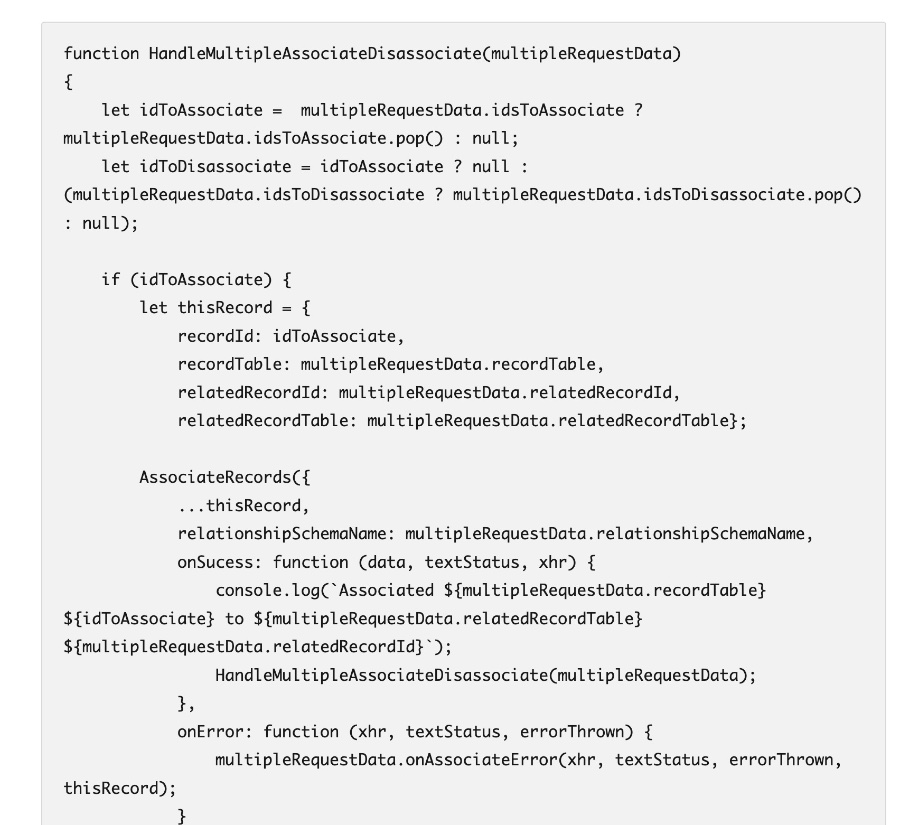
Optimize Power Pages: JavaScript for N:N Record Management
Streamline N:N Dataverse Relationships with Power Pages Web API
Key insights

- Using JavaScript and Power Pages Web API, Michel Mendes [MVP] teaches how to manage multiple N:N relationships for custom relationships between Accounts and Contacts.
- Prerequisites include enabling required fields for the WebAPI, adding WebAPI Wrapper code, configuring an N:N relationship in Dataverse, and using generic functions AssociateRecords and DisassociateRecords from a previous post.
- The HandleMultipleAssociateDisassociate function utilizes recursion to process multiple associate and disassociate operations, accepting an object containing arrays of ids and callback functions.
- This method allows for efficient processing of records to associate or disassociate by continuously calling itself with updated parameters until all record IDs are processed.
- Error handling is crucial, as bulk requests are not treated as a single transaction. Implementing onWebAPIAssociateError and onWebAPIDisassociateError functions are recommended to manage failed requests.
Expanding on JavaScript and Power Pages Web API for N:N Relationship Management
Understanding and managing N:N (Many-to-Many) relationships between records in Microsoft's Dataverse can be complex, especially when dealing with bulk associate and disassociate requests. JavaScript combined with Power Pages Web API offers a powerful solution, enabling developers to programmatically handle these relationships with greater ease and flexibility. The method outlined by Michel Mendes [MVP] revolves around a recursive function that efficiently processes an array of records to be associated or disassociated, leveraging the dynamic capabilities of JavaScript and the robustness of Power Pages Web API.
The approach not only automates the process but also incorporates error handling mechanisms to ensure reliability and data integrity. This method is particularly useful for developers working on applications that require dynamic association and disassociation of records in response to user actions or business logic. It eliminates the need for manual processing and significantly reduces the potential for errors, providing a scalable solution for managing complex data relationships in Dataverse.
Read the full article Handle multiple N:N records associate and disassociate requests with JavaScript and Power Pages Web

In a recent blog post, the focus is on enhancing Power Pages functionality. It delves into handling multiple N:N records for associate and disassociate requests using JavaScript. The technique builds upon previous discussions on creating and managing N:N relationships within Power Pages' environment.
The author, an expert in Power Pages, introduces a new function designed for bulk handling of these requests. This function is particularly useful when dealing with arrays of IDs, allowing for efficient processing of multiple associate or disassociate operations simultaneously.
To utilize this functionality, the post outlines certain prerequisites such as enabling the required fields for the WebAPI and configuring an N:N relationship in Dataverse. It also revisits the generic functions from earlier posts for associating and disassociating records, highlighting the importance of these foundational concepts.
- The need for a comprehensive approach when handling large volumes of records is emphasized, alongside considerations for error handling.
- The process leverages recursion to manage multiple records efficiently, updating the status through callback functions based on success or error outcomes.
- Specifically, it manages arrays of record IDs to associate or disassociate, executing operations recursively until all records are processed.
Error management plays a critical role in this process, with custom functions to handle associate or disassociate errors. This ensures the robust performance of the functionality in various scenarios.
The post concludes with a call-to-action, encouraging the implementation of this approach to streamline operations within the Power Pages framework. This advanced handling of N:N records demonstrates the platform's flexibility and the power of JavaScript in customizing and extending its capabilities.
Keywords
JavaScript, Power Pages Web, associate records, disassociate records, N:N relationships, CRM customization, web development, records management